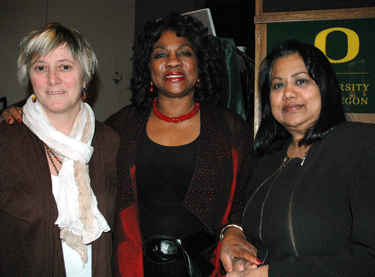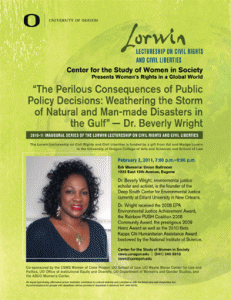Introduction for Dr. Beverly Wright, Director, Deep South Center for Environmental Justice
by Margaret L. Paris, Philip H. Knight Dean and Professor, University of Oregon School of Law

Dr. Beverly Wright (center) with CSWS Director Carol Stabile (l) and CSWS Associate Director Lamia Karim.
Dr. Wright spoke on “The Perilous Consequences of Public Policy Decisions: Weathering the Storm of Natural and Man-made Disasters in the Gulf” at the EMU Ballroom on February 2, 2011, sponsored by the Center for the Study of Women in Society Women of Color Project, School of Law, Wayne Morse Center for Law and Politics, Office of Institutional Equity and Diversity, Department of Women’s and Gender Studies, Department of Anthropology, and the ASUO Women’s Center.
Along the Mississippi River in Louisiana, there is an 85-mile stretch between New Orleans and Baton Rouge known as the Mississippi River Chemical Corridor. This is an area humming with activity from literally hundreds of manufacturing plants producing chemicals, plastics, fertilizers, and oil products. And alongside these plants live thousands of people whose lives are affected profoundly by the presence and practices of these plants.
The area is known infamously as “cancer alley,” because of the claim—contested by industry—that cancer is more prevalent among its inhabitants than it is in other populations.
Inhabitants of this corridor are predominantly poor and black. For many years they faced alone nearly insurmountable challenges in protecting their homes and health, obtaining access to information about the industries that surround them, attracting the attention of government agencies that are supposed to regulate the release of toxins.
They gained an important ally in 1992, when Dr. Beverly Wright founded the Deep South Center for Environmental Justice. Now situated at Dillard University in New Orleans, where Dr. Wright teaches and works, the Center has spent the last two decades dealing head-on with issues of environmental racism and working to raise the profile of environmental issues in poor and minority communities nationwide.
 Dr. Wright, whose academic specialty is environmental sociology, first began tackling the issue of environmental justice in the late 1970s, while studying for her master’s and doctorate degrees at the State University of New York at Buffalo. One of her mentors at SUNY Buffalo was Adeline Levine, who made the first industrial pollution case study at Love Canal, a neighborhood in Niagara Falls, N.Y., that was built atop a toxic waste site.
Dr. Wright, whose academic specialty is environmental sociology, first began tackling the issue of environmental justice in the late 1970s, while studying for her master’s and doctorate degrees at the State University of New York at Buffalo. One of her mentors at SUNY Buffalo was Adeline Levine, who made the first industrial pollution case study at Love Canal, a neighborhood in Niagara Falls, N.Y., that was built atop a toxic waste site.
After she graduated and returned home to Louisiana to embark on her own academic career, Dr. Wright began seeing a pattern – often the communities situated in or adjacent to environmentally hazardous areas are poor and black. She began developing a system to track the demographics of Cancer Alley. Her work to document and expose environmental racism was path-breaking.
Becoming the founding director of the Deep South Center was a way of connecting her research with her desire to help communities who live among the consequences of environmental racism and environmental disasters. Indeed, she has unfortunately become quite an expert in environmental disasters. After Hurricane Katrina submerged much of New Orleans in 2005, Dr. Wright, who lost her home during the storm, relocated the Center to Baton Rouge to educate and train New Orleanians to remediate and reclaim their homes and their political base. Responding to last year’s tragic Gulf oil spill, she has been training people to become involved in hands-on remediation efforts and to provide Cajun, Vietnamese, and Hispanic fishermen with translated materials so they can join in cleanup efforts.
This last effort exemplifies her desire to empower community people to speak and act for themselves.
In addition to her work at the Deep South Center, Dr. Wright also has been active in local, national, and international environmental justice work. She has served on many boards and commissions, including the U.S. Commission on Civil Rights and the Environmental Justice Climate Change Initiative. In 2009 she was a delegate to the United Nations Conference on Climate Change in Copenhagen.
She has received numerous awards, including the 2006 Robert Wood Johnson Community Health Leadership Award, the 2008 EPA Environmental Justice Achievement Award, the 2009 Heinz Award, and this past year the National Institute of Science’s Humanitarian Assistance Award.
Note: Airing February 21, 2011, on UO Today—Dr. Beverly Wright, environmental scholar and founding director of the Deep South Center for Environmental Justice at Dillard University, discusses her work advocating for the African-American community in New Orleans.
UO Today, the Oregon Humanities Center’s half-hour television interview program, provides a glimpse into the heart of the University of Oregon. Each episode offers viewers a conversation with UO faculty and administrators as well as visiting scholars, authors, and artists whose groundbreaking work is shaping our world. “UO Today” can be viewed throughout Western Oregon on educational and public access cable TV. UO Today Channels

